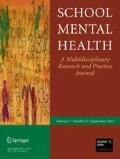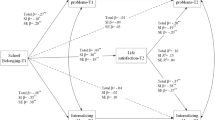Abstract
Individuals’ well-being underpins a strong and sustainable society. Schools are increasingly recognized as key facilitators of well-being producing young people who can flourish across the life span. The current research explores and extends a new model that integrates core aspects of school relational climate (teacher and peer relationships) and school identification (connectedness, belonging) in explaining student negative well-being (depression and stress) in a non-Western cultural context. Measures included students’ perceptions of school relational climate, school identification, stress, and depressive symptoms in 1369 students across six Chinese schools. The results indicated that school relational climate and school identification were significantly associated with Chinese adolescents’ negative well-being in line with predictions based on the social identity perspective; there was also evidence that school identification mediated school-based relationships and negative well-being. The findings provide greater confidence in the variables of school relational climate and school identification in being related to youth well-being and showcase their generalizability and applicability to non-Western cultural settings. The research also provides insights into pathways forward to address mental health in Chinese schools through school relational climate.




Similar content being viewed by others
References
Anderman, E. M. (2002). School effects on psychological outcomes during adolescence. Journal of Educational Psychology, 94(4), 795–809.
Bizumic, B., Reynolds, K. J., & Meyers, B. (2012). Predicting social identification over time: The role of group and personality factors. Personality and Individual Differences, 53(4), 453–458.
Bizumic, B., Reynolds, K. J., Turner, J. C., Bromhead, D., & Subasic, E. (2009). The role of the group in individual functioning: School identification and the psychological well-being of staff and students. Applied Psychology-an International Review-Psychologie Appliquee-Revue Internationale, 58(1), 171–192.
Bond, L., Butler, H., Thomas, L., Carlin, J., Glover, S., Bowes, G., et al. (2007). Social and school connectedness in early secondary school as predictors of late teenage substance use, mental health, and academic outcomes. Journal of Adolescent Health, 40(4), 357. e359–357. e318.
Brand, S., Felner, R., Shim, M., Seitsinger, A., & Dumas, T. (2003). Middle school improvement and reform: Development and validation of a school-level assessment of climate, cultural pluralism, and school safety. Journal of Educational Psychology, 95, 570–588.
Brault, M. C., Janosz, M., & Archambault, I. (2014). Effects of school composition and school climate on teacher expectations of students: A multilevel analysis. Teaching and Teacher Education, 44, 148–159.
Call, K. T., Riedel, A. A., Hein, K., McLoyd, V., Petersen, A., & Kipke, M. (2002). Adolescent health and well-being in the twenty-first century: A global perspective. Journal of Research on Adolescence, 12(1), 69–98.
Catalano, R. F., Haggerty, K. P., Oesterle, S., Fleming, C. B., & Hawkins, J. D. (2004). The importance of bonding to school for healthy development: Findings from the Social Development Research Group. Journal of School Health, 74(7), 252–261.
Cohen, J., McCabe, L., Michelli, N. M., & Pickeral, T. (2009). School climate: Research, policy, practice, and teacher education. Teachers college record, 111(1), 180–213.
Dodge, R., Daly, A. P., Huyton, J., & Sanders, L. D. (2012). The challenge of defining wellbeing. International Journal of Wellbeing, 2(3), 222–235.
Fong Lam, U., Chen, W. W., Zhang, J., & Liang, T. (2015). It feels good to learn where I belong: School belonging, academic emotions, and academic achievement in adolescents. School Psychology International, 36(4), 393–409.
Goodenow, C. (1993). Classroom belonging among early adolescent students relationships to motivation and achievement. The Journal of Early Adolescence, 13(1), 21–43.
Haslam, S. A., Jetten, J., Postmes, T., & Haslam, C. (2009). Social identity, health and well-being: An emerging agenda for applied psychology. Applied Psychology-an International Review-Psychologie Appliquee-Revue Internationale, 58(1), 1–23.
Jia, Y., Way, N., Ling, G., Yoshikawa, H., Chen, X., Hughes, D., et al. (2009). The influence of student perceptions of school climate on socioemotional and academic adjustment: A comparison of Chinese and American adolescents. Child Development, 80(5), 1514–1530.
Jie, Z., Zhen-Yun, W. U., Ge, F., Juan, L. I., Bu-Xin, H. A. N., Zhi-Yan, C., et al. (2010). Development of the Chinese age norms of CES-D in urban area. Chinese Mental Health Journal, 24(2), 139–143.
Joseph, S., & Wood, A. (2010). Assessment of positive functioning in clinical psychology: Theoretical and practical issues. Clinical Psychology Review, 30(7), 830–838.
La Greca, A. M., & Harrison, H. M. (2005). Adolescent peer relations, friendships, and romantic relationships: Do they predict social anxiety and depression? Journal of Clinical Child and Adolescent Psychology, 34(1), 49–61.
Lakey, B., & Cohen, S. (2000). Social Support and Theory (pp. 29–52). Social support measurement and intervention: A guide for health and social scientists.
Lee, E., Reynolds, K. J., Subasic, E., Bromhead, D., Lin, H., Marinov, V., et al. (2017). Development of a dual school climate and school identification measure student (SCASIM-St). Contemporary Educational Psychology, 49, 91–106.
Lee, J. S., Koeske, G. F., & Sales, E. (2004). Social support buffering of acculturative stress: A study of mental health symptoms among Korean international students. International Journal of Intercultural Relations, 28(5), 399–414.
Liem, G. A. D., & Martin, A. J. (2011). Peer relationships and adolescents’ academic and non-academic outcomes: Same-sex and opposite-sex peer effects and the mediating role of school engagement. British Journal of Educational Psychology, 81(2), 183–206.
Liu, Y. (2012). Students’ perceptions of school climate and trait test anxiety. Psychological Reports, 111(3), 761–764.
Liu, Y., & Lu, Z. (2011a). Trajectories of Chinese students’ sense of school belonging and academic achievement over the high school transition period. Learning & Individual Differences, 21, 187–190.
Liu, Y., & Lu, Z. (2012). Chinese high school students’ academic stress and depressive symptoms: Gender and school climate as moderators. Stress and Health, 28(4), 340–346.
Liu, Y. Y., & Lu, Z. H. (2011b). The Chinese high school student’s stress in the school and academic achievement. Educational Psychology, 31(1), 27–35.
Malloy, M., Acock, A., DuBois, D. L., Vuchinich, S., Silverthorn, N., Ji, P., et al. (2015). Teachers’ perceptions of school organizational climate as predictors of dosage and quality of implementation of a social-emotional and character development program. Prevention Science, 16(8), 1086–1095.
Maxwell, S., Reynolds, K. J., Lee, E., Subasic, E., & Bromhead, D. (2017). The impact of school climate and school identification on academic achievement: Multilevel modeling with student and teacher data. Frontiers in Psychology, 8, 2069.
Moos, R. H., & Moos, B. S. (1978). Classroom social climate and student absences and grades. Journal of Educational Psychology, 70(2), 263.
Muthen, B. O., & Satorra, A. (1995). Complex sample data in structural equation modeling. Sociological Methodology, 25, 267–316.
Nolen-Hoeksema, S., & Girgus, J. S. (1994). The emergence of gender differences in depression during adolescence. Psychological Bulletin, 115(3), 424.
Oberle, E., Schonert-Reichl, K. A., & Zumbo, B. D. (2011). Life satisfaction in early adolescence: Personal, neighborhood, school, family, and peer influences. Journal of Youth and Adolescence, 40(7), 889–901.
Perren, S., Dooley, J., Shaw, T., & Cross, D. (2010). Bullying in school and cyberspace: Associations with depressive symptoms in Swiss and Australian adolescents. Child and Adolescent Psychiatry and Mental Health, 4(1), 28.
Reddy, R., Rhodes, J. E., & Mulhall, P. (2003). The influence of teacher support On student adjustment in the middle school years: A latent growth curve study. Development and Psychopathology, 15(1), 119–138.
Rutter, M. (1987). Psychosocial resilience and protective mechanisms. American Journal of Orthopsychiatry, 57(3), 316–331.
Ryan, R. M., Stiller, J. D., & Lynch, J. H. (1994). Representations of relationships to teachers, parents, and friends as predictors of academic motivation and self-esteem. The Journal of Early Adolescence, 14(2), 226–249.
Siegel, R. S., La Greca, A. M., & Harrison, H. M. (2009). Peer victimization and social anxiety in adolescents: Prospective and reciprocal relationships. Journal of Youth and Adolescence, 38(8), 1096–1109.
Thapa, A., Cohen, J., Guffey, S., & Higgins-D’Alessandro, A. (2013). A review of school climate research. Review of Educational Research, 83(3), 357–385.
Tian, L., Zhang, L., Huebner, E. S., Zheng, X., & Liu, W. (2016). The longitudinal relationship between school belonging and subjective well-being in school among elementary school students. Applied Research in Quality of Life, 11(4), 1269–1285.
Townsend, L., Musci, R., Stuart, E., Ruble, A., Beaudry, M. B., Schweizer, B., et al. (2017). The association of school climate, depression literacy, and mental health stigma among high school students. Journal of School Health, 87(8), 567–574.
Turner, I., Reynolds, K. J., Lee, E., Subasic, E., & Bromhead, D. (2014). Well-being, school climate, and the social identity process: A latent growth model study of bullying perpetration and peer victimization. School Psychology Quarterly, 29(3), 320–335.
Turner, J. C. (1991). Social influence. Pacific Grove: Thomson Brooks/Cole Publishing Co.
Turner, J. C., & Reynolds, K. J. (2012). Self-categorization theory. In P. Van Lange, A. Kruglanski, & T. Higgins (Eds.), Handbook of theories in social psychology (pp. 399–417). Thousand Oaks: Sage.
Veit, C. T., & Ware, J. E. (1983). The structure of psychological distress and well-being in general populations. Journal of Consulting and Clinical Psychology, 51(5), 730–742.
Way, N., Reddy, R., & Rhodes, J. (2007). Students’ perceptions of school climate during the middle school years: Associations with trajectories of psychological and behavioral adjustment. American Journal of Community Psychology, 40(3–4), 194–213.
Way, N., Santos, C., Niwa, E. Y., & Kim-Gervey, C. (2008). To be or not to be: An exploration of ethnic identity development in context. New Directions for Child and Adolescent Development, 2008(120), 61–79.
Yang, C., Bear, G. G., Chen, F. F., Zhang, W., Blank, J. C., & Huang, X. (2013). Students’ perceptions of school climate in the US and China. School Psychology Quarterly, 28(1), 7.
Yang, J. A., Yao, S. G., Zhu, X. Z., Zhang, C. C., Ling, Y., Abela, J. R. Z., et al. (2010). The impact of stress on depressive symptoms is moderated by social support in Chinese adolescents with subthreshold depression: A multi-wave longitudinal study. Journal of Affective Disorders, 127(1–3), 113–121.
Acknowledgements
Funding was provided by the 12th Five Year Plan of Jiangsu Education (Grant No. B-a/2015/01/001), Jiangsu Social Science Foundation (Grant No. 15SHC006) and Jiangsu Association of Science and Technology.
Author information
Authors and Affiliations
Corresponding author
Ethics declarations
Conflict of interest
The authors declare that they have no competing interests.
Ethical Approval
All procedures followed were in accordance with the ethical standards of the responsible committee on human experimentation.
Informed Consent
Informed consent was obtained from all participants included in the study.
Rights and permissions
About this article
Cite this article
Tong, L., Reynolds, K., Lee, E. et al. School Relational Climate, Social Identity, and Student Well-Being: New Evidence from China on Student Depression and Stress Levels. School Mental Health 11, 509–521 (2019). https://doi.org/10.1007/s12310-018-9293-0
Published:
Issue Date:
DOI: https://doi.org/10.1007/s12310-018-9293-0




